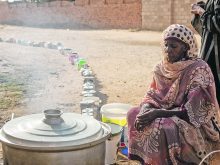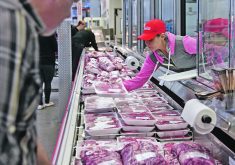The United Nations has adopted a crystal-clear position on food that comes from livestock — meat, milk and eggs are essential for human health.
Experts with the UN’s Food and Agriculture Organization looked at 500 scientific papers and 250 policy documents on the benefits and risks of animal-based foods.
After reviewing all the data and studies, on April 25 they published a report with a concise message.
“Meat, eggs and milk offer crucial sources of much-needed nutrients which cannot easily be obtained from plant-based foods,” the FAO said in a news release to promote the report, called Contribution of terrestrial animal source food to healthy diets for improved nutrition and health outcomes.
Read Also

VIDEO: Bittersweet harvest for this family farmhand
Bruce Burnett helps his brother harvest wheat and canola for the last time on the family farm in Manitoba where they both grew up.
The FAO said meat, eggs and dairy provide essential macro nutrients, such as protein, fats and carbohydrates, as well as important micronutrients.
“High quality protein, a number of essential fatty acids, iron, calcium, zinc, selenium, vitamin B12, choline and bioactive compounds like carnitine, creatine, taurine are provided by foods from terrestrial animals and have important health and developmental functions.”
None of this is news to Melanie Rozwadowski, an assistant professor in the college of pharmacy and nutrition at the University of Saskatchewan.
She already understood that plants cannot replace the nutrients found in meat, dairy and eggs.
“I’m not surprised at all,” she said.
“If our diet is lacking in diversity, or overall amount, we’re going to be missing out on certain nutrients.”
One obvious nutrient in milk is calcium.
It’s possible to get calcium from plants, but it’s not easy.
“People talk about almonds or people talk about legumes, like beans, or green, leafy vegetables,” said Rozwadowski, who is a registered dietician.
To get the equivalent calcium of a glass of milk from plant-based food could require 15 plates of cooked spinach or 2.5 cups of beans.
Rozwadowski said it’s difficult to get minerals such as zinc and iron from plants.
“Iron and zinc are both essential minerals. In plants we simply don’t absorb them as well … because they’re in an inorganic form,” she said.
“Our bodies don’t absorb that (like) the iron in meat, which is heme iron.”
In its report, the FAO said iron and zinc deficiencies are widespread in poorer countries.
“Iron and vitamin A are among the most common micronutrient deficiencies around the world, particularly in children and pregnant women,” said a UN News story on the study.
“More than one in two preschool children (some 372 million) and 1.2 billion women of child-bearing age … suffer from the lack of at least one of three micronutrients: iron, vitamin A or zinc.”
A shortage of iron and zinc can cause a list of health problems, such as stunted growth, cognitive development, anemia and depressed immune function.
“Deficiencies of iron and zinc are major causes of early childhood morbidity and mortality, primarily in developing countries,” says Elad Tako, a U.S. Department of Agriculture scientist.
Meat, milk and eggs also contain vitamins that are difficult to get from plants, especially vitamin B12, which is essential for the body’s nervous system and helps with red blood cell formation.
“B12 is only found in animal products,” Rozwadowski said. “There’s lots of misinformation online, unfortunately directed towards vegans, (saying) you can get B12 from things like algae or fermented soy products. You can’t.”
The FAO says getting sufficient nutrients is “vital during key life stages,” such as pregnancy, lactation, childhood and older age.
However, a balanced and diverse diet is critical at any stage of life, Rozwadowski said.
“The most critical stage is from conception to about two years of age — no question. That is what they call the first 1,000 days,” she said.
“(It can) have lifelong impacts if we’re low on iron, B12 and some of the other nutrients.”
The FAO report isn’t telling Canadians and people in wealthy countries to eat more meat, milk and eggs — we don’t need to consume more saturated fat.
“We are absolutely eating too many animal-based sources, in the privileged nations,” Rozwadowski said.
“We should be having more plant-based things, in general.”
However, a healthy diet isn’t a black and white discussion. It’s not a case where plants are good and food from livestock is evil.
Adopting an extreme diet, with no milk, eggs and meat, can have serious health outcomes, especially for young children.
“When the clinical studies come across (my) desk, talking about kids who are coming into hospitals in the United States and Canada, they have rickets, lack of vitamin D and their legs are bent because they haven’t been drinking any milk … next to no calcium,” Rozwadowski said.
“There has to be a balance…. And that’s what we’re missing. It always seems to be one extreme or the other.”


















